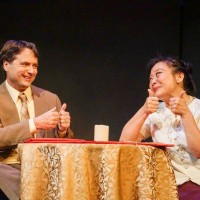CATS’ production of “Chinglish”: a window into cultures with humor, candor
 In recent years, we have enjoyed productions of Broadway’s most beloved shows in the Sierra foothills. Examples include the “Music Man,” “Peter Pan” and “Into the Woods” from Sierra Stages; “The King and I” from Community Asian Theatre of the Sierra; and “A Christmas Carol” by LeGacy Presents.
In recent years, we have enjoyed productions of Broadway’s most beloved shows in the Sierra foothills. Examples include the “Music Man,” “Peter Pan” and “Into the Woods” from Sierra Stages; “The King and I” from Community Asian Theatre of the Sierra; and “A Christmas Carol” by LeGacy Presents.
We’ve also noticed, however, that our region’s theater companies are venturing into more unchartered territory with “edgier,” more thought-provoking shows, including Off Broadway productions.
We have enjoyed Sierra Stages’ production of “Avenue Q,” a coming-of-age parable that received 12 nominations for regional Elly awards; and “Vanya and Sonia and Masha and Spike,” a humorous adaptation of Chekhov themes, among others.
This is a testament to the quality of our region’s community theatre, where the audiences increasingly trust the theater companies to deliver great productions — regardless of the content. It takes time to build that relationship.
Nowhere has this crossover (from “G” to “PG-13” in movie parlance) become more apparent than with CATS current production of “Chinglish,” a play by Tony Award-winning playwright David Henry Hwang that explores the Chinese-American cultural divide. The production for CATS 22nd season runs through April 30 at the Nevada Theatre in Nevada City, and we wholeheartedly recommend it.
“What’s impressive is how shrewdly Hwang makes a common cultural joke—the wacky mistranslations of American slang into Chinese—the entry point for a serious and nuanced study of the Chinese-American cultural divide,” as Time magazine wrote. (The New York playwright, the son of immigrant Chinese parents, attended Stanford).
What’s more, the play’s characters speak many of their lines in Mandarin Chinese (with translations in subtitles that are shown on the stage). Only one person in the audience spoke Mandarin, CATS Executive Director Jeannie Wood determined before the play, asking Mandarin speakers to raise their hand.
Culture gap
The play begins with hilarious examples of “Chinglish,” with poorly translated signs such as “Take notice of safe: the slippery are very crafty.” In a humorous twist, the signs are displayed in the lobby of the theater too.
In “Chinglish,” an Ohio businessman Daniel Cavanaugh visits Guiyang, a city of “only” 4 million in the province of Guizhou in southwest China, to score a lucrative contract for his family’s firm. But the deal isn’t all that gets lost in translation when Cavanaugh collides with a Communist minister, a bumbling consultant and a sexy bureaucrat.
“The play allows us to both laugh and examines two clashing sensibilities of both love and business,” as Director Annie Lareau writes in her Director’s Notes. “Though the comedy comes from the misinterpretations of language, much more is gained from insight into the values and mores that differ in the East versus the West.”
Last season, CATS was fortunate to secure Annie Lareau as its director for “Hotel on the Corner of Bitter and Sweet,” based on the book by Jamie Ford that explored Japanese-Chinese relations in a love story.
The cast includes Laurence Hughes (who plays Cavanaugh); Kathy Hsieh (Xi Yan); David Rosprim (Peter Timms); Hock Tjoa (Cai Guoliang); Xio Juan Shu (Qian and prosecutor Li); Wei-Jung Rachel Tsai, (Zhao); and Kai Lin (Bing and Judge Geming).
We were impressed by Rosprim’s fluent Mandarin (he studied Mandarin in college), as well as the rest of the cast.
Splendid cast
Kathy Hsieh, Laurence Hughes and Hock Tjoa, among others, all were splendid in their roles. The play explored a range of emotions: Hsieh was playful, Hughes, Rosprim and Guoliang were all frighteningly honest and funny at times too. (Parents should note that the play includes some adult language and sexual activity; our teenage son handled it with maturity).
“Chinglish” pokes fun at both American and Chinese cultures. We laughed at the Chinglish signs but also the Enron jokes. The failed energy giant comes up in the context of “high rollers,” a romanticized theme in the play. Name and brand recognition carry a lot of weight in China, even for Enron, which gambled its future away.
Other themes we learn about through the characters’ actions are “guanxi,” defined as relationship (which I jokingly referred to as an American “good old boys” network); and “mian zi,” or respect and appropriate deference.
At the end of “Chinglish,” we are left with the impression that we might never bridge the Chinese-American culture gap, an honest assessment but not exactly a fairy tale ending.
CATS seeks to promote diversity through the arts through multicultural theater, events and workshops. With “Chinglish,” it has come up with a winner — thought-provoking and well executed.
(Photo: David Wong)
